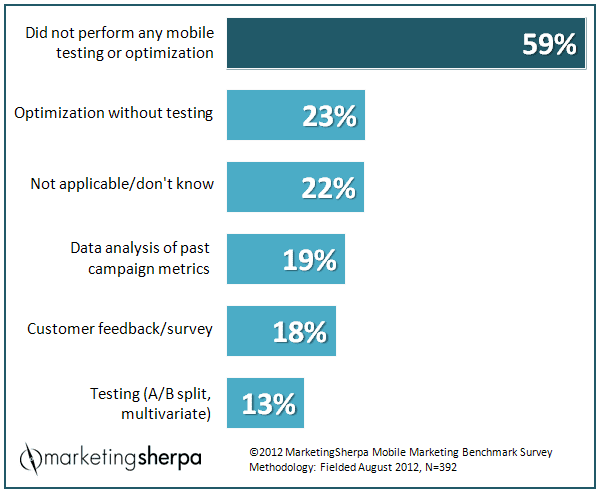My how things have changed the past 5-7 years. Up until the last few years, it was rather impractical to think of mobile phones or tablets as fully-functional devices with computing power akin to that of a full computer.

After Apple changed the game with the iPhone and later the iPad, others followed suit.
Similar to the PC industry, though, Apple (iOS) continues to own a niche market while Android has grown to dominate the market for smartphones.
As tablets grow in market share and adoption continues to head toward market saturation, this story is far from over.
In fact, Gartner called out “Mobile Devices Battles” and “Mobile Applications & HTML5” as the top 2 strategic technology trends for 2013.
Click the image to the right to read the full summary of the Gartner list in the image.
So basically, these new platforms are established and growing in adoption.
Everyone knows they are important, so the logical conclusion is that all websites should be mobile-optimized.
What Mobile Optimization Efforts Are Under Way?
Knowing that mobile is crucial today, let’s look at the findings of a recent Marketing Sherpa survey question: “What mobile marketing optimization efforts were utilized by your organization in 2012?”
As expected, a good share of respondents are at least analyzing mobile data and campaigns and looking to take action on it. But the big findings here?
Nearly 60% of us are not doing ANYTHING to position ourselves for success in mobile.
Another 22% of respondents basically chose not to answer, so it’s reasonable to assume that the answer is also “nothing” in most of those cases.
After all, if they are doing it, shouldn’t the marketing folks know?
Given the growth in adoption, this is clearly a disconnect.
Why Aren’t More of Us Optimizing for Mobile?
This is the million dollar question, because the logic dictates that we pay more attention to new mobile form factors.
There are many reasons one might not choose to take the leap, so let’s look at some of the most common issues.
No Incremental Budget Available
This is the one of the two most common objections I hear from marketers who are not ready to make the jump to mobile.
Especially for smaller businesses, budget is very limited.
The existing website may be costing a large share of the monthly budget to maintain, update, and optimize.
What is one to do – reduce support for the main website to optimize for mobile?
Pull budget from R&D to throw at it?
The reality is that many companies simply cannot afford to move to mobile.
Until it becomes more important than something else that is currently prioritized higher, the budget problem will not go away.
Lack of Resources to Support Mobile
Similar to the budget objection, insufficient support resources is a very common reason for postponing the move to mobile.
After the massive downturn we just suffered, many companies have slashed back expenses and are operating as lean as possible.
With much of the existing employee base already tapped out, there is simply no one available to even think about mobile in many companies.
This rears its ugly head in two ways – lack of time and lack of skillset to take this on in the first place.
Of course, budget and resources overlap for those of us who outsource a large share of the work.
If you manage web development internally, though, both issues can be barriers to kicking off a mobile optimization effort.
Over-focus on Historical Metrics
I hear it time and time again from clients and peers: “We will start getting serious about mobile when it accounts for more than 10% of our overall web traffic.”
Depending on your product, service, or market, this might have been okay in 2011 and early 2012.
But stop and think for a second – is the problem a lack of traffic from mobile, or is the lack of traffic from mobile a reality because you haven’t taken the time to optimize the experience?
Two years ago, I might have accepted the former.
Today, if you are not getting 10% of your traffic from mobile, you need to take a hard look at whether that is the unfortunate result of keeping your head in the sand when you should be moving forward.
Measure your progress using history, but plan your marketing strategy around where the world is today and will be tomorrow.
Mobile is here and will not go away any time soon.
Inability to Properly Analyze Mobile Results
This is another area that leads to confusion with many marketers.
They look at the volumes of searches and paid search clicks and assume that mobile is simply a bad channel for search marketing due to lack of volume.
The key is to think of mobile as incremental traffic.
You are not giving up traffic on your website by adding a mobile optimized version.
You are providing an opportunity for more people to experience your website via more access methods. The pie is getting bigger overall!
Meanwhile, you need to be analyzing traffic quality on mobile, even at much lower volumes.
How excited would you be to launch a content marketing campaign that drove a 5% increase in web traffic for three months?
How about if you could increase that number by 10% and get double the conversion rate on the incremental?
The key is to analyze mobile traffic using the same hybrid web / business metrics, such as conversions/visit and revenues/visit.
Using these metrics, you can quickly determine whether your mobile success rates are better or worse than your standard website metrics.
From there, you can test different UI / UX approaches, mobile-focused messaging, and even SEO and PPC strategies.
Mobile: Time to Get Serious
These few excuses for procrastination are big ones, but not the only possible reasons for postponing mobile optimization.
For some of us, we may still have time to catch up. But for most of us, the time is now to get serious about mobile.
Don’t wait for your competitors to get out there and leave you in their dust. The business opportunity is there for the taking.
Tommy Landry
Latest posts by Tommy Landry (see all)
- Where AI Introduces Risk Into Revenue Planning - February 19, 2026
- AI Is Already Influencing Your Forecasting. Do You Know Where? - February 18, 2026
- AI -Driven Discoverability Presentation at AIMA (January 2026, Full Video) - February 17, 2026





